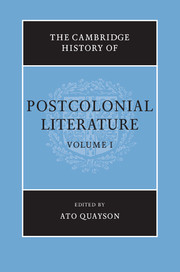Book contents
- Frontmatter
- 1 Introduction: postcolonial literature in a changing historical frame
- 2 Postcolonial fictions of slavery
- 3 Postcolonialism and travel writing
- 4 Missionary writing and postcolonialism
- 5 Postcolonial auto/biography
- 6 Orality and the genres of African postcolonial writing
- 7 Canadian literatures and the postcolonial
- 8 Postcolonialism and Caribbean literature
- 9 Postcolonialism and Arab literature
- 10 Postcolonialism and postcolonial writing in Latin America
- 11 Postcolonial writing in South Africa
- 12 Postcolonial literature in Southeast Asia
- 13 Postcolonial South Asian poetry
- 14 Postcolonial writing in India
- 15 Postcolonial writing in Australia and New Zealand
- 16 Indigenous writing in Canada, Australia and New Zealand
- 17 Postcolonial writing in Ireland
- 18 Postcolonial writing in Britain
- 19 Postcolonial writing in France
- 20 Postcolonial writing in Germany
- References
10 - Postcolonialism and postcolonial writing in Latin America
Published online by Cambridge University Press: 28 January 2012
- Frontmatter
- 1 Introduction: postcolonial literature in a changing historical frame
- 2 Postcolonial fictions of slavery
- 3 Postcolonialism and travel writing
- 4 Missionary writing and postcolonialism
- 5 Postcolonial auto/biography
- 6 Orality and the genres of African postcolonial writing
- 7 Canadian literatures and the postcolonial
- 8 Postcolonialism and Caribbean literature
- 9 Postcolonialism and Arab literature
- 10 Postcolonialism and postcolonial writing in Latin America
- 11 Postcolonial writing in South Africa
- 12 Postcolonial literature in Southeast Asia
- 13 Postcolonial South Asian poetry
- 14 Postcolonial writing in India
- 15 Postcolonial writing in Australia and New Zealand
- 16 Indigenous writing in Canada, Australia and New Zealand
- 17 Postcolonial writing in Ireland
- 18 Postcolonial writing in Britain
- 19 Postcolonial writing in France
- 20 Postcolonial writing in Germany
- References
Summary
This chapter explores Latin American discursive production responding to and accompanying European colonization in America. The time frame starts with pre-European Native narratives and concludes with formal political emancipation and the early foundations of the national states in the mid nineteenth century. I will focus on texts produced in Spanish and Portuguese, two of three major imperial languages of the subcontinent. The literature produced under the influence of French domination, including Haiti, will be addressed by other authors in this volume. Any survey of Latin Americamust not forget that indigenous cultures did not disappear at the moment of European arrival. They continued – and still continue – to produce culturally specific products, some of which address colonial circumstances. However, the literature produced in indigenous languages during this period constitutes an entirely different subject and can only be treated circumstantially in this chapter. Without being exhaustive, the chapter will nonetheless provide an introduction to the cultural history of the period by highlighting the significance of a number of key texts. These few texts are both representative and allow me to advance the argument that the American colonial experience inaugurates four motifs fundamental to our postcolonial present.
- Type
- Chapter
- Information
- The Cambridge History of Postcolonial Literature , pp. 288 - 328Publisher: Cambridge University PressPrint publication year: 2012
References
- 1
- Cited by



